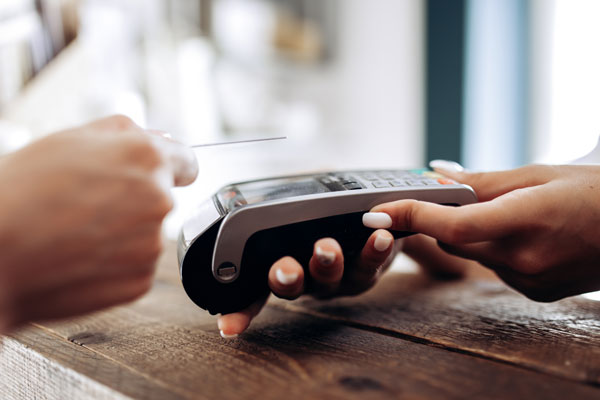
Overdraft Protection
While it is important for you to manage your checking account responsibly and to never intentionally overdraw your account, we realize that financial shortfalls happen from time to time. Life happens, and everyone can sometimes make a mistake or encounter financial challenges, so we have overdraft protection options to assist you in these situations.
Options To Manage Overdrafts
What Is An
Overdraft?
Automatic
Transfers
Non-Sufficient Funds (NSF)
What Is An Overdraft?
An overdraft occurs when you do not have enough available funds in your account to cover a transaction. Fortunately, Honor has various options to manage these situations when they occur. Which option you choose will determine how these overdrafts will be handled (whether the transaction is paid or not) and the resulting fee that will be charged to your account.
Examples of Account Overdrafts
- You use your debit card to make a purchase and the transaction total is more than your available checking account balance.
- You have automatic payments set up from your Honor checking account and the due date falls before your next payday.
- You have $200 in your account and you have a pending bill payment for $150. Then, you spend more than $50 to cause an overdraft.

Setting Up Automatic Transfers
One overdraft protection option we offer members is to set up automatic transfers from another designated account to cover the insufficient funds in your checking account. Below are options to consider. Give us a call at 800.442.2800, stop by a local member center, or start a chat with us to set this up for you.
Transfer From Another Account
You can set up an automatic transfer from a savings account, or another Honor checking account* to the checking account when there are insufficient funds.
- Regular or Special Share Savings Account
- Surge or Momentum Money Market Account
- Another Honor checking account
- An overdraft fee of $5 is charged for each transfer from these accounts, as disclosed on our Rates and Fees Schedule*
Transfer From a Line of Credit or Credit Card
You can set up an automatic transfer from a line of credit, such as a home equity line of credit, or an Honor credit card to cover your overdraft.
- No fee is charged to transfer funds from these accounts to an overdrafted account
- Subsequent interest charges may accrue as these are loans
- You must be approved for the line of credit or credit card first before it can be set up as an overdraft protection option
- Transfers are processed as a Cash Advance and additional finance charges may apply.
Courtesy Pay
If you have not set up automatic transfer, or if you have set it up but don’t have enough funds in your designated account(s) to cover the overdraft transaction, then Courtesy Pay would come into play. Courtesy Pay is a service extended on all eligible checking accounts in good standing that allows members to overdraw their accounts up to $1,000 (inclusive of fees) for checks, in-person withdrawals, recurring and one-time ACH transactions, and preauthorized automatic transfers.*
What To Know About Courtesy Pay
- Courtesy Pay is automatically extended on all eligible checking accounts as long as a few criteria are met. ^
- A Courtesy Pay Fee of $22 is charged for each overdrafted transaction as disclosed on our Rates and Fees Schedule*
- Overdrafts above and beyond your Courtesy Pay limit of $1,000 may result in items being returned unpaid to the merchant or payee. A non-sufficient funds (NSF) fee of $22 per item will also be charged to your account (refer to the NSF section below).
Courtesy Pay For ATM & One-Time Debit Card Transactions
- Based on a government regulation, members must opt themselves in to Courtesy Pay for ATM transactions and one-time debit card transactions.**
- If opted in, these transactions will be covered by Courtesy Pay if sufficient funds are not available.
- If you choose not to opt in, your transactions may be declined when trying to use your card, or an NSF fee could be charged, if funds are not available.
Repayment of Courtesy Pay
- Courtesy Pay payments made by Honor to cover a transaction must be repaid. You must bring your account to a positive balance at least once within every 30-day period. The account must remain positive for 24 hours.
- It can be as simple as transferring funds from another account to bring the overdrafted account back to a positive balance.
- If you need assistance bringing your account back to a positive balance you can work with our Credit Solutions team by calling 800.442.2800 during normal business hours.
^The checking account must be open for at least 30 days (this will be reflected in your second statement after account opening), and to be in “good standing” you must (1) be making regular deposits sufficient to cover transactions, (2) bring the account to a positive balance at least once every 30 days, and (3) not have any legal orders outstanding on the account.
Non-Sufficient Funds (NSF)
An NSF occurs when you don’t have the funds available in your checking account to pay one or more of your transactions, and you either (1) don’t have an Overdraft Protection option like an automatic transfer or Courtesy Pay in place, or (2) all funds have been exhausted from your designated transfer accounts and you’ve already exceeded your Courtesy Pay limit.

What Happens With an NSF?
- The overdrafted transaction is not paid by Honor and it is returned.
- An NSF fee of $22 is charged for every returned transaction as disclosed on our Rates and Fees Schedule*
- You may also be charged an additional fee from the merchant for whom the payment was originally intended.
Contact Us
If you have questions about setting up overdraft protection, or what option might be best for you, don’t hesitate to reach out to us. Simply, call, text, or chat with us, and our Virtual Member Center team can help!
* An overdraft transaction must be $5 or more to generate an overdraft, courtesy pay, or NSF fee. We pay overdrafts at our discretion, which means we do not guarantee that we will always authorize and pay any type of transaction. We use your available balance (not current balance) to determine whether sufficient funds are available when transactions attempt to clear the account and for determining whether to charge an overdraft or returned item fee. Click to view the Honor Credit Union Rates and Fees schedule.


